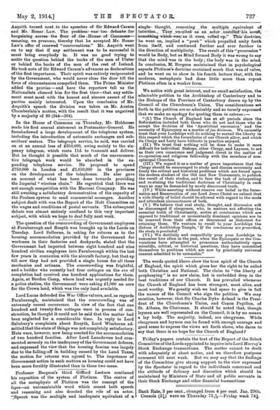We notice with great interest, and no small satisfaction, the
admirable petition to the Archbishop of Canterbury and to the Bishops of the Province of Canterbury drawn up by the Council of the Churchmen's Union. The considerations set forth in the petition are so admirably and so tersely expressed that we make no apology for quoting them in eatenso:- "(L) The Church of England has at all periods since the Reformation included both those who do not and those who do accept the doctrine of the 'Apostolical succession' and the necessity of Episcopacy as a matter of jss divinum. We earnestly trust that your Lordships will do nothing to curtail the liberty in this respect which the formularies of our Church allow, and which its Clergy and Laity have hitherto in practice enjoyed.
(IL) We trust that nothing will be done to make it more difficult for individual Bishops, other Clergy, and Laymen, to act as their own conscience and judgment direct in the matter of co-operation and religious fellowship with the members of non- episcopal Churches.
(III.) We regard it as a matter of grave importance that the Clergy should be encouraged to study and discuss reverently and freely the critical and historical problems which are forced upon the modern student of the Old and New Testaments, to publish the result of their studies, and to face the task of interpreting and re-stating the traditional doctrines of Christianity in such ways as may be demanded by newly discovered truth.
(IV.) While asserting without reserve our belief in the Incar- nation and Resurrection of our Lord Jesus Christ we submit that a wide liberty of belief should be allowed with regard to the mode and attendant circumstances of both.
(V.) We believe that real study, thought, and discussion will be discouraged if clergymen, who, in matters not affecting the essential truth of Christianity, arrive at conclusions which are opposed to traditional or momentarily dominant opinions are to be removed from their offices or denounced sie dishonest for retaining them. We venture to recall to your Lordships the
dictum of Archbishop Temple, the conchisions ars prescribed, the study is precluded?
(VI.) We dutifully and respectfully pray your Lordships to remember how often in the past, when the Episcopate or the Con- vocations have attempted to pronounce authoritatively upon scientific, critical, or historical questions, they have committed themselves to positions which are now by practically universal consent admitted to be untenable."














































 Previous page
Previous page